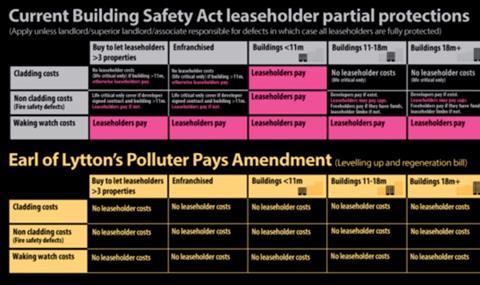The Earl of Lytton’s “polluter pays” amendment to the Levelling Up and Regeneration Bill will be debated on Monday
The House of Lords on Monday will debate a possible amendment to the Levelling Up and Regeneration Bill that would see developers pay in full for building defects if they are found to have breached building regulations.
On Monday the second chamber will discuss the Earl of Lytton’s ‘Polluter Pays’ amendment, designed to protect leaseholders paying for any building defects, including non-cladding safety issues.
This would be stronger than the legislation introduced through the Building Safety Bill last April, which gave the government powers to stop developers building if they did not commit to remediating safety defects in tower blocks over 11m where they have had involvment in the past 30 years.
The act also allowed the government to set its proposed £3bn levy to cover works on ‘orphaned blocks’ – those where the owner can’t be traced.
The amendment to be discussed on Monday, based on drafting by Daniel Greenberg, former parliamentary counsel and currently Parliamentary Commissioner for Standards, would see a builder or developer pay in full if found by the government to have breached building regulations at the time of construction. Or it would be funded via a wide construction industry levy if the builder could not pay.
The amendment is thought unlikely to have the backing of the government so is therefore not expected to become law.
The Earl of Lytton and supporters say that leaseholders are still having to pay for building safety remediation costs in some cases, including cladding and non-cladding costs on buildings under 11m in height (see graphic below).

The Earl of Lytton will say in his address: “The simple truth is the government does not have the money to solve the problem and is at present unprepared to place the responsibility on the wealthy construction industry that has created this over decades of marking its own homework. The proposals I am advancing would resolve this.”
Alison Hills, a senior solicitor and advocate at firm Slater & Gordon, said on Twitter of the amendment: “We all know that there are many excluded leaseholders [from the cladding contract]. Those in buildings under 11m, those who own more than three properties, those who are enfranchised.” The amendment is also expected protect buy-to-let landlords with three or more properties.
Hills added the amendment was the “only solution on the table to protect everyone, no matter where you live, how many properties you own, the height of your building or if you’re enfranchised and I believe it works.”
Former State Premier of Australia Ted Baillieu, who was co-chair of an official ‘cladding task force’ in Australia between 2017 and 2019, said: “This amendment’s going to cover off everything – not just cladding but all defects and all other costs and establish a principle that if you don’t build according to the regulations, it doesn’t matter how long ago you did it, you’ll have to pay to fix it.”
A potential banking crisis could be averted through the amendment, which could come about by unprotected leaseholders and buy-to-let landlodrds struggling to pay huge remediation costs, the advocates of the amendment believed. They also thought it could prevent builders from “corner-cutting”.
The government changes to building safety have been brought about by the tragic Grenfell Tower fire in 2017, in which 72 people died. Cladding was found to be a huge contributor to the fire spreading.










No comments yet